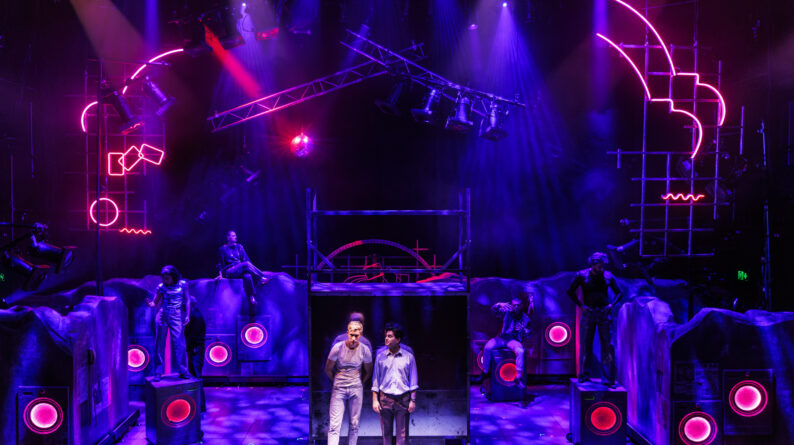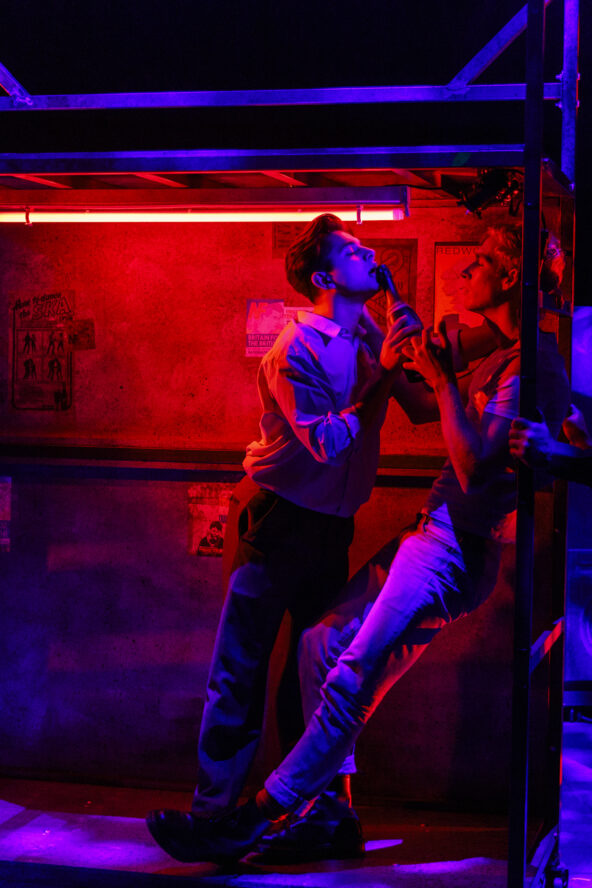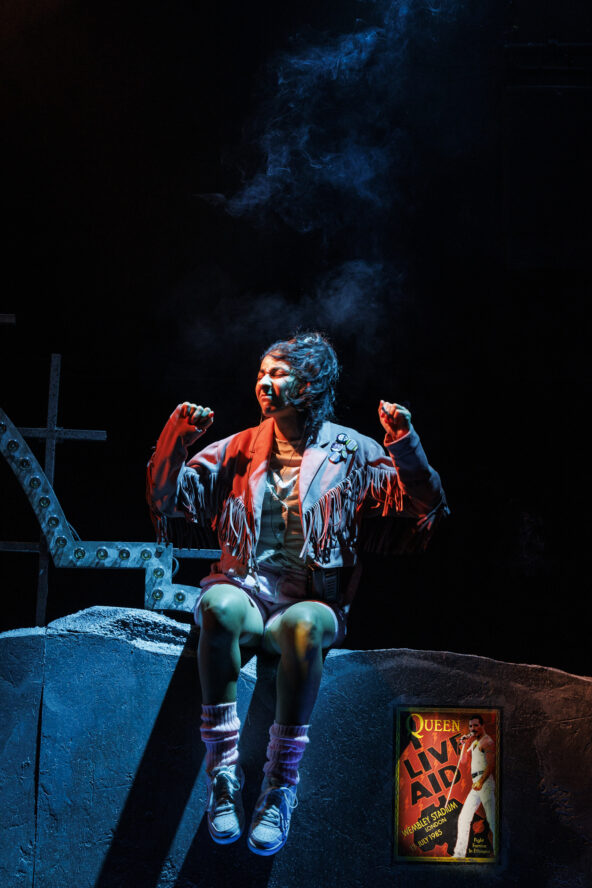
University of Leicester Emerging Reviewers
In partnership with the University of Leicester, we’re inspiring the next generation of arts journalists with our Emerging Reviewers programme.
Focusing on our Made at Curve production of MY BEAUTIFUL LAUNDRETTE, students on the university’s English and Arts Journalism module joined us to observe rehearsals for the show and to speak to members of the cast and creative team. Students also attended the play’s official press night on Wednesday 21 February 2024.
Read their reviews below.
MY BEAUTIFUL LAUNDRETTE production photography by Ellie Kurttz.
—
the story still resonates with our world today
Witty, stirring, and charming, Curve’s production of My Beautiful Laundrette captures the struggle for one’s own freedom within the white supremacist capitalist structure of Thatcher’s Britain. Director Nicole Behan refreshes the narrative while keeping the grit and bold spirit of Hanif Kureishi’s screenplay of the original film. Omar (Lucca Chadwick-Patel) is swept into his uncle Nasser’s world of enterprise, of washing machines and smart suits and money. ‘There is money in muck!’ he proclaims. With the opposite beliefs, Papa (Gordon Warnecke, who played Omar in Stephen Frears’ film) was a famous journalist back in Pakistan, now a bedridden alcoholic. He does not want his son Omar ‘cleaning underpants’; he believes education is freedom.
Omar reconnects with his childhood friend Johnny (Sam Mitchell), who is confused and pressured by his fascist friends. He struggles for a place to belong until he partners up with Omar to run his uncle’s laundrette, thus beginning a beautiful relationship. That is not to say their relationship is without conflict; they are still trapped by issues of homophobia, racism, and class. The pair boasts a powerful performance filled with chemistry, intertwining quick-wit and sensitivity.
Bright neon lights, leg warmers, monochrome power suits, The Pet Shop Boys – what could veer into a cliché only enhances the raw, sensuous tone of 1985. And it’s funny too, despite the heavy themes. The play captures a sense of social realism and the racist conflicts between white and Pakistani cultures. A Margaret Thatcher speech is played, looming over as white skinhead thugs Genghis (Paddy Daly) and Moose (Emma Bown) discuss the need for a revolution. It is violent at times, necessary to portray the extent of conflicts created through the policies of political forces of the time. Undeniably, the story still resonates with our world today.
There is a fresh focus on women’s struggles in this play. Nasser’s daughter and Omar’s suitable wife, Tania, is played with high energy by Sharan Phull. She is fiery, mouthy, and strong-willed, especially during her monologue, where she expresses her desire to belong somewhere other than as her father’s servant. Additionally, Rachel (Emma Bown), Nasser’s mistress, struggles to find her place amidst the chaos. Refreshingly, it is not only the male leads, Omar and Johnny, that are given voices.
My Beautiful Laundrette leaves us with a hopeful message: the world is out there, and change can happen – despite everything.
Bubbles of Fun!
The Curve’s newest production of My Beautiful Laundrette revived my love for theatre and left me searching for when I could watch it again.
Despite being set in 1980s London, the play’s raw depiction of racism, the housing crisis and rebellion against a corrupt UK government felt like I was looking into a mirror of the present day. The lead characters, Omar (Lucca Chadwick-Patel) and Johnny (Sam Mitchell), have a circumstance-defying love comparable to Shakespeare’s Romeo and Juliet. Lucca and Sam’s portrayal of lovers was breathtakingly passionate and complex. In fact, the entire cast’s shared chemistry was evident and pivotal throughout the production and behind the scenes in the rehearsal process.
Moreover, the convincing multi-roling from several of the actors allowed the cast of eight to create lively scenes, such as Nasser’s (Kammy Darweish) party and the 1985 style club, without interrupting the suspension of the audience’s disbelief. Set and costume designer Grace Smart aided this believability; her colourful designs were impressively intricate and undoubtedly 80s. Smoothly choreographed set changes also allowed the laundrette to transform into anything from a bedroom to a nightclub in seconds.
Nicole Behan’s directorial decisions perfectly complemented the plot of Hanif Kureshi’s screenplay, and it was a pleasure to see her enthusiasm when directing the actors in rehearsals. Nicole created a comfortable atmosphere, positioning herself as equal to the actors and having the flexibility to trial their ideas alongside her own. Witnessing this show coming together behind the scenes made me even more invested during the performance’s emotional final scene. Did I mention there were bubbles? Hundreds of bubbles!
I could write pages on the incredible contribution of each member of the production team and each cast member. Everyone who worked on this production should be incredibly proud of what they have created.
Spinning convention on its head
My Beautiful Laundrette, a beauty indeed.
From the bright reflective disco ball to the potent stench of the prop cigarettes, this production of the 1985 film is vivid, brimming with complex yet relatable stories and a magnificently compelling cast. Nicole Behan’s production at Leicester’s Curve is one that truly evokes all the colour and wonder of the mainstream film whilst maintaining Hanif Kureishi’s airtight 2019 script. The grim reality of struggling with homosexuality in a Thatcherite Britain as a young adult is not lessened in the slightest, and the play’s unflinching approach to portraying the racial and gender struggles of its characters makes it all the more resonant for audiences today. There is an intense grapple for freedom from each of the characters, and the play refuses to conceal it in layers of subtext or euphemism, instead displaying it unabashedly; it permeates, a distinct motivator rippling throughout, unobscured.
At the centre of My Beautiful Laundrette’s chaos lies Omar (Lucca Chadwick-Patel), a naive smarmy British-Pakistani man ready to delve into the gritty filth and urban grime of the bustling adult world of the 80s. He weaves through the menagerie of characters, constantly striving for his own haven. A haven he finds in the laundrette. Bringing in his childhood friend – later lover – Johnny (Sam Mitchell), Omar dabbles in drug deals, trifles with thieves and manages some manipulation to ensure his success. On the flip side, Johnny, itching for the opportunity of a clean slate and tired with his life and its endless slew of robberies, finds his freedom with Omar. Together, the two bring up this dilapidated financial black hole into a glamorous, neon beacon of hope amidst this crumbling depiction of South London; a symbol for everything their future could contain.
Whilst Chadwick-Patel and Mitchell’s incredible chemistry is undeniable, the rest of the cast were instrumental in the brilliant success of Behan’s play. Hareet Deol delivers a powerful performance as Salim, one of the antagonists of the play. In his flamboyant pink suit, he manages to balance that peculiar, vibrant masculinity of the 80s with his character’s cutthroat cunning. Gordon Warnecke, who originally starred as Omar in the film, returns in a full circle moment to put his own spin on the character of Papa, in a tasteful rendition of Roshan Seth’s initial depiction.
Most striking, perhaps, is Tania (Sharan Phull), who refuses to be pigeonholed into the role of Nasser’s dutiful daughter or traded like a marriage mare, passed from one suitor to the next. Behan’s added scenes featuring Tania indubitably adds more depth, rounding out a spunky female character to be something more, without removing her humour and playfulness. Phull’s scenes with Rachel (Emma Bown), Nasser’s mistress, speak to female solidarity rather than competition, framing Tania’s voice with a feminist mould creates an inherent focus on the female experience and agency, separate from the male oriented plot lines of the play – a marked improvement to Kureishi’s male dominated film.
The themes of play, with heavy racism and coming-of-age elements, are hard hitting and swift, the characters almost merciless in their prejudice and self-centredness; yet Behan manages to make them sympathetic – and far more likeable – than Kureishi’s 1985 film, where paradoxically the historical roles of the British and the immigrant are reversed, as the hustled and the hustler respectively. Ultimately, it all comes back to the the laundrette. It is the place where Omar and Johnny reconnected, and it is their way out – a place for them to have the liberty to be their most authentic selves, and to live their most authentic lives, content with the knowledge that through it all, they will “look after each other.”


From rags to riches
“Are you a politician? … A journalist? No! You clean underpants!”
Dir. by Nicole Behan, this production returns from a 5 year break (courtesy of COVID) to deliver their refreshing rendition of ‘My Beautiful Laundrette’. With a run time of 2 hours 30 minutes – I can guarantee you it feels like less – this stunning performance premiered at Leicester’s The Curve Theatre and will be on tour in East London and Manchester, February – March 2024.
Staying true to the original film’s style and message, although with its own quirks, the setting of South London is translated to the stage in a grey-rubbled, graffitied version of the laundrette. An armchair, 3 washing machines, a makeshift scaffolded balcony and a sink. One of its quirks is the fashion: Salim (Hareet Deol) sports a bold pink suit; Rachel’s tacky shoulder-padded green blazer speaks for itself; and the fascist gang flaunt their skinhead-issue Doc Martens.
This performance and its cast of 8 extraordinary and talented actors impeccably tackles the themes of relationships, problematic ideology and dysfunctional families. We are whisked into the beautiful story of Omar and Johnny’s blossoming relationship (Lucca Chadwick-Patel and Sam Mitchell) that is faced with the rivalry between the white fascist working class gang and Omar’s Pakistani family. We follow Omar’s progress from rags to riches, where he starts off by working for his uncle Nasser (Kammy Darweish) from cleaning cars to “cleaning underpants” in his own laundrette – despite Papa’s (Gordon Warnecke) wish for him to pursue college and to marry.
Gordon, who played Omar in the 1985 film, returns to play the role of Papa. He steals the show with his comic overreaction to Omar cutting his toenails carelessly, when distracted by Johnny on the phone. Also returning from the original film is writer Hanif Kureishi, who adds in scenes never seen before that explore a relationship between Tania and Rachel (Sharan Phull and Emma Bown) and Genghis’ dramatic monologue (Paddy Daly).
I thoroughly enjoyed this show and its immaculate portrayal of the issues in the 1980s, which are still very much with us today. It was entertaining, comical and versatile as the actors took us from intimate scenes to intemperate fights, both verbal and physical and ultimately ends on a hopeful and playful note. I wholly recommend watching this laudable performance set in a beautiful laundrette
Surprisingly uplifting despite the gritty urban backdrop
Curve’s production of My Beautiful Laundrette is an engaging representation of individuals fighting for their freedom against the societal expectations of their culture and Thatcher’s repressed Britain. Director Nicole Behan’s version of Stephen Frears’s original 1985 film, is warm and surprisingly uplifting despite the gritty urban backdrop. The production is a perfect combination of comedy and anticipation of changing times; a microcosm of the high racial and socio-economic tension that defined the 1980’s in England.
An impressive aspect of the show is the lighting; creating an alluring atmosphere and even being used as a plot device at points where the lighting is key to the production. The bright neons and subtle under-glow are crucial in making the set feel so immersive. From the colourful washing machines to the sharp bursts of light at points, this set comes to life through lighting and should commended for its creativity. This combined with the trendy music sets the mood of the entire production. Music reminiscent of 80s pop is another reminder of the setting whilst also allowing for organic scene changes throughout. My Beautiful Laundrette is a production full of innuendos that appeal to the censored society of Thatcher’s Britain and produce playful moments scattered throughout. The comedy creates a lighthearted atmosphere that elevates the very real plot of the play, rather than distracting from it.
The production contains many nods to the 80s setting, from the neon lights to the puff sleeves sported by Rachel (Emma Bown). Of course, you can’t discuss costumes without mentioning Salim’s (Hareet Deol) pink suit, the real star of the show. The cliches of the era elevate the production, creating an immersive experience. The nods to the era never feel forced or imitations, instead they serve as another reminder of the harsh realities of an era that is often looked upon with rose-tinted glasses. My Beautiful Laundrette is a story of oppression, restraints and socio-economic crisis that remain applicable to the modern day. However, there is a bittersweet ending that leaves the audience feeling optimistic, an uplifting end to such an intense social drama.
Love where you'd least expect it
Nicole Behan presents a comical and captivating rendition of My Beautiful Laundrette, offering an insight into the struggles of surviving within Thatcher’s years of racism and white superiority as a person of colour. Mirroring Hanif Kureishi’s initial presentation of the graphic, harsh reality Omar faces, the Curve’s production offers a new perspective of this screenplay, from the influence of the 80s taking a centre role, to the unfiltered themes of racism and violence continued to be portrayed. From the Pet Shop Boys to white supremacist speeches, this production has it all: music, love, homosexuality, social battles and the true nature of society.
Omar, played by Lucca Chadwick Patel, is depicted as a young boy aiming to make his father (Gordon Warnecke) proud in a world where the odds are against him. From completing his O-Levels to “cleaning underpants”, Omar strives for success, despite his father’s disapproval of neglecting further education, facing implausible challenges along the way. Taking over a laundrette from his uncle Nasser, Omar is faced with the test of proving his potential whilst experiencing constant racial abuse. Compelled by his right-winged, fascist friends Genghis and Moose, Johnny (Sam Mitchell) plays a key role within the play, shifting from a man following a violent path, to reconnecting with Omar, commencing a new relationship with his childhood friend. Despite escaping his past, Johnny exposes Omar to the world of homophobia and racism to a new extent, experiencing prejudice from all angles, however, they support and protect each other through this. Their undeniable chemistry in a society where there is nothing worse than a Pakistani and a white man coming together, the typical love story is subverted into a poignant exploration of love and human connections.
This production gives voice to the underlying plot within the play, presenting a revitalising inclusion of women’s struggles, where Tania, Nasser’s daughter, feels trapped in her life, believing either marriage or an escape are her only options to life. Behan’s focus on Tania offers an alternative view on society, presenting how it is not only race and sexuality which poses as a threat to the characters’ lives, but also their gender.
Heart wrenching, shocking and humorous at times, the Curve portrays a society where white and Asian are cultures are pinned against each other, whilst offering a sense of hope through Johnny and Omar’s budding relationship which defies all the odds.
My Beautiful Laundrette is a story of love and violence, still present in today’s world, which leaves the audience with the reassurance that things can change and with love the impossible becomes plausible.
A symbol of reinventing Oneself
The adaptation of Hanif Kureishi’s 1985, socio-political masterpiece, ‘My Beautiful Laundrette’ is striking in its relatability to present times. Director Nicole Behan’s intricate detailing is evident in the cast’s ability to embody such contrasting personalities, offering multidimensional perspectives which reflect the political upheaval of Thatcherite Britain. Omar’s (Lucca Chadwick-Patel) naivety creates a humorous tone, as he transforms his uncle’s Laundrette with the help of his old school friend Johnny (Sam Mitchell), which Omar views as an opportunity for emancipation from race and class struggles.
The atmosphere of the 80s is conveyed down to the very music, with Queen’s ‘I want to break free’ used almost as a refrain throughout the play, reflecting the overarching theme of finding one’s place in a British society, where no one seems to find belonging. The minimalistic, yet effective setting of the Laundrette, combined with the neon lights evokes the nostalgia of the 80s whilst maintaining a sense of irony through the mirroring of socio-economic issues that are still prevalent today. The nuances of gender and sexuality, reflected through Tania’s attempt to escape gender conformity, and Omar and Jonny’s transgressive relationship, create a sense of hope for change, symbolized through the setting of the Laundrette. The Laundrette epitomizes cultural hybridity, yet outside of the safety of this setting any sense of hope is eradicated, depicted by the chauvinistic attitudes of Tania’s father, Nesser (Kammy Darweish) and xenophobic attitudes that characterize society.
My Beautiful Laundrette portrays a history of ongoing class and racial struggles, reminding the audience that behind Hanif’s witty remarks, these issues are still prevalent today.
